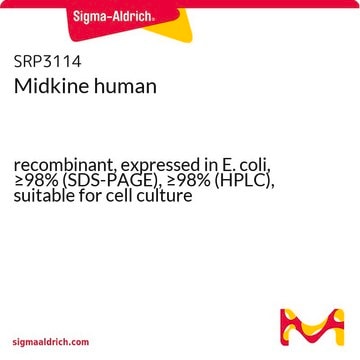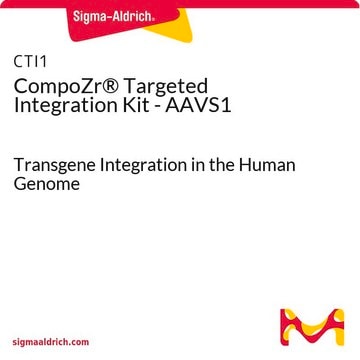推荐产品
生物源
mouse
重組細胞
expressed in E. coli
化驗
≥98% (HPLC)
≥98% (SDS-PAGE)
形狀
lyophilized
分子量
13.4 kDa
包裝
pkg of 20 μg
雜質
<0.1 EU/μg endotoxin, tested
顏色
white to off-white
UniProt登錄號
運輸包裝
wet ice
儲存溫度
−20°C
基因資訊
mouse ... MDK(17242)
一般說明
MK plays an important regulatory role in epithelial-mesenchymal interactions during fetal development and in postnatal lung development. MK chemoattracts embryonic neurons, neutrophils and macrophages, and by signaling through the ALK receptor it exerts angiogenic, growth and survival activities during tumorgenesis.
生化/生理作用
Midkine and its functionally-related protein Pleiotrophin are heparin-binding neurotrophic factors that signal through the same receptor, known as anaplastic lymphoma kinase (ALK). Recombinant murine Midkine is a 13.4 kDa protein containing 123 amino acid residues including five intra-molecular disulfide bonds.
外觀
Lyophilized from 0.4x PBS, pH 7.4.
重構
Centrifuge the vial prior to opening. Reconstitute in water to a concentration of 0.1-1.0 mg/mL. Do not vortex. This solution can be stored at 2-8°C for up to 1 week. For extended storage, it is recommended to further dilute in a buffer containing a carrier protein (example 0.1% BSA) and store in working aliquots at -20°C to -80°C.
儲存類別代碼
12 - Non Combustible Liquids
水污染物質分類(WGK)
WGK 1
閃點(°F)
Not applicable
閃點(°C)
Not applicable
W Iwasaki et al.
The EMBO journal, 16(23), 6936-6946 (1998-01-31)
Midkine (MK) is a 13 kDa heparin-binding polypeptide which enhances neurite outgrowth, neuronal cell survival and plasminogen activator activity. MK is structurally divided into two domains, and most of the biological activities are located on the C-terminal domain. The solution
Neibla Priego et al.
Nature medicine, 24(7), 1024-1035 (2018-06-13)
The brain microenvironment imposes a particularly intense selective pressure on metastasis-initiating cells, but successful metastases bypass this control through mechanisms that are poorly understood. Reactive astrocytes are key components of this microenvironment that confine brain metastasis without infiltrating the lesion.
我们的科学家团队拥有各种研究领域经验,包括生命科学、材料科学、化学合成、色谱、分析及许多其他领域.
联系技术服务部门








